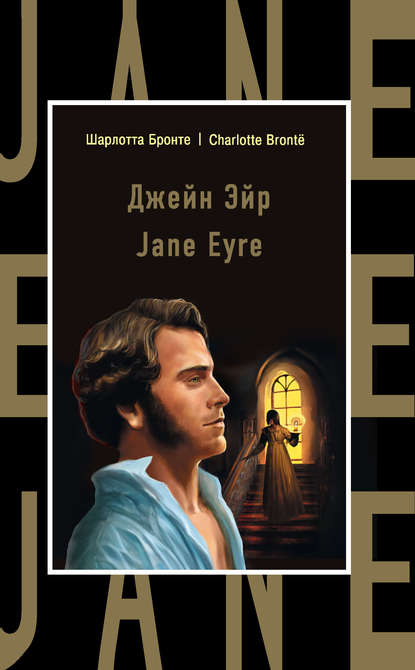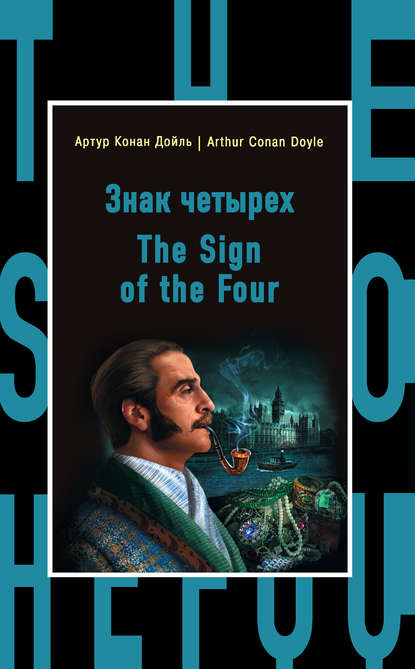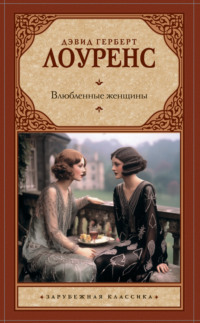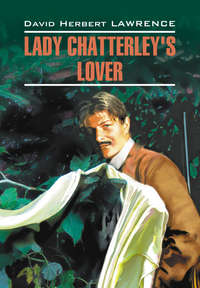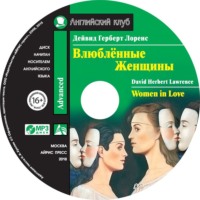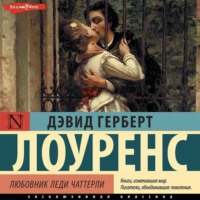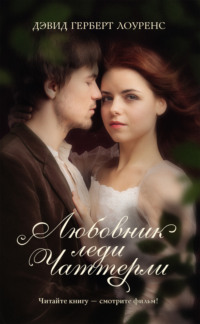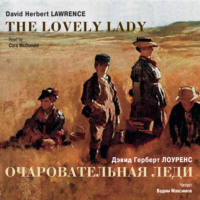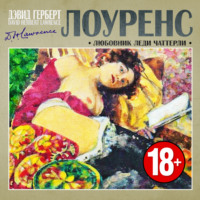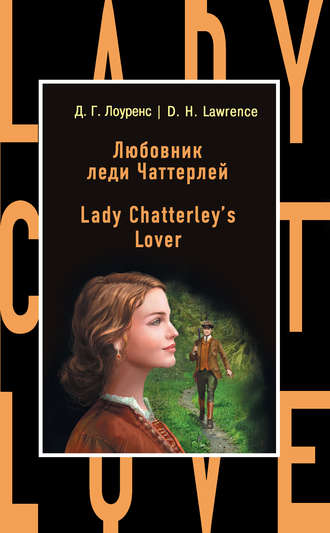
Полная версия
Любовник леди Чаттерлей / Lady Chatterley's Lover
And yet was he not in a way to blame? This lack of warmth, this lack of the simple, warm, physical contact, was he not to blame for that? He was never really warm, nor even kind, only thoughtful, considerate, in a well-bred, cold sort of way! But never warm as a man can be warm to a woman, as even Connie’s father could be warm to her, with the warmth of a man who did himself well, and intended to, but who still could comfort a woman with a bit of his masculine glow.
But Clifford was not like that. His whole race was not like that. They were all inwardly hard and separate, and warmth to them was just bad taste. You had to get on without it, and hold your own; which was all very well if you were of the same class and race. Then you could keep yourself cold and be very estimable, and hold your own, and enjoy the satisfaction of holding it. But if you were of another class and another race it wouldn’t do; there was no fun merely holding your own, and feeling you belonged to the ruling class. What was the point, when even the smartest aristocrats had really nothing positive of their own to hold, and their rule was really a farce, not rule at all? What was the point? It was all cold nonsense.
A sense of rebellion smouldered in Connie. What was the good of it all? What was the good of her sacrifice, her devoting her life to Clifford? What was she serving, after all? A cold spirit of vanity, that had no warm human contacts, and that was as corrupt as any low-born Jew,[48] in craving for prostitution to the bitch-goddess, Success. Even Clifford’s cool and contactless assurance that he belonged to the ruling class didn’t prevent his tongue lolling out of his mouth, as he panted after the bitch-goddess. After all, Michaelis was really more dignified in the matter, and far, far more successful. Really, if you looked closely at Clifford, he was a buffoon, and a buffoon is more humiliating than a bounder.
As between the two men, Michaelis really had far more use for her than Clifford had. He had even more need of her. Any good nurse can attend to crippled legs! And as for the heroic effort, Michaelis was a heroic rat, and Clifford was very much of a poodle showing off.
There were people staying in the house, among them Clifford’s Aunt Eva, Lady Bennerley. She was a thin woman of sixty, with a red nose, a widow, and still something of a grande dame. She belonged to one of the best families, and had the character to carry it off. Connie liked her, she was so perfectly simple and frank, as far as she intended to be frank, and superficially kind. Inside herself she was a past-mistress in holding her own, and holding other people a little lower. She was not at all a snob: far too sure of herself. She was perfect at the social sport of coolly holding her own, and making other people defer to her.
She was kind to Connie, and tried to worm into her woman’s soul with the sharp gimlet of her well-born observations.
“You’re quite wonderful, in my opinion,” she said to Connie. “You’ve done wonders for Clifford. I never saw any budding genius myself, and there he is, all the rage.” Aunt Eva was quite complacently proud of Clifford’s success. Another feather in the family cap! She didn’t care a straw about his books, but why should she?
“Oh, I don’t think it’s my doing,” said Connie.
“It must be! Can’t be anybody else’s. And it seems to me you don’t get enough out of it.”
“How?”
“Look at the way you are shut up here. I said to Clifford: If that child rebels one day you’ll have yourself to thank!”
“But Clifford never denies me anything,” said Connie.
“Look here, my dear child’ – and Lady Bennerley laid her thin hand on Connie’s arm. “A woman has to live her life, or live to repent not having lived it. Believe me!” And she took another sip of brandy, which maybe was her form of repentance.
“But I do live my life, don’t I?”
“Not in my idea! Clifford should bring you to London, and let you go about. His sort of friends are all right for him, but what are they for you? If I were you I should think it wasn’t good enough. You’ll let your youth slip by, and you’ll spend your old age, and your middle age too, repenting it.”
Her ladyship lapsed into contemplative silence, soothed by the brandy.
But Connie was not keen on going to London, and being steered into the smart world by Lady Bennerley. She didn’t feel really smart, it wasn’t interesting. And she did feel the peculiar, withering coldness under it all; like the soil of Labrador, which his gay little flowers on its surface, and a foot down is frozen.
Tommy Dukes was at Wragby, and another man, Harry Winterslow, and Jack Strangeways with his wife Olive. The talk was much more desultory than when only the cronies were there, and everybody was a bit bored, for the weather was bad, and there was only billiards, and the pianola to dance to.
Olive was reading a book about the future, when babies would be bred in bottles, and women would be “immunized”.
“Jolly good thing too!” she said. “Then a woman can live her own life.” Strangeways wanted children, and she didn’t.
“How’d you like to be immunized?” Winterslow asked her, with an ugly smile.
“I hope I am; naturally,” she said. “Anyhow the future’s going to have more sense, and a woman needn’t be dragged down by her functions.”
“Perhaps she’ll float off into space altogether,” said Dukes.
“I do think sufficient civilization ought to eliminate a lot of the physical disabilities,” said Clifford. “All the love-business for example, it might just as well go. I suppose it would if we could breed babies in bottles.”
“No!” cried Olive. “That might leave all the more room for fun.”
“I suppose,” said Lady Bennerley, contemplatively, “if the love-business went, something else would take its place. Morphia, perhaps. A little morphine in all the air. It would be wonderfully refreshing for everybody.”
“The government releasing ether into the air on Saturdays, for a cheerful weekend!” said Jack. “Sounds all right, but where should we be by Wednesday?”
“So long as you can forget your body you are happy,” said Lady Bennerley. “And the moment you begin to be aware of your body, you are wretched. So, if civilization is any good, it has to help us to forget our bodies, and then time passes happily without our knowing it.”
“Help us to get rid of our bodies altogether,” said Winterslow. “It’s quite time man began to improve on his own nature, especially the physical side of it.”
“Imagine if we floated like tobacco smoke,” said Connie.
“It won’t happen,” said Dukes. “Our old show will come flop; our civilization is going to fall. It’s going down the bottomless pit, down the chasm. And believe me, the only bridge across the chasm will be the phallus!”
“Oh do! Do be impossible, General!” cried Olive.
“I believe our civilization is going to collapse,” said Aunt Eva.
“And what will come after it?” asked Clifford.
“I haven’t the faintest idea, but something, I suppose,” said the elderly lady.
“Connie says people like wisps of smoke, and Olive says immunized women, and babies in bottles, and Dukes says the phallus is the bridge to what comes next. I wonder what it will really be?” said Clifford.
“Oh, don’t bother! let’s get on with today,” said Olive. “Only hurry up with the breeding bottle, and let us poor women off.”
“There might even be real men, in the next phase,” said Tommy. “Real, intelligent, wholesome men, and wholesome nice women! Wouldn’t that be a change, an enormous change from us? we’re not men, and the women aren’t women. We’re only cerebrating make-shifts, mechanical and intellectual experiments. There may even come a civilization of genuine men and women, instead of our little lot of clever-jacks, all at the intelligence-age of seven. It would be even more amazing than men of smoke or babies in bottles.”
“Oh, when people begin to talk about real women, I give up,” said Olive.
“Certainly nothing but the spirit in us is worth having,” said Winterslow.
“Spirits!” said Jack, drinking his whisky and soda.
“Think so? Give me the resurrection of the body!” said Dukes.
“But it’ll come, in time, when we’ve shoved the cerebral stone away a bit, the money and the rest. Then we’ll get a democracy of touch, instead of a democracy of pocket.”
Something echoed inside Connie: “Give me the democracy of touch, the resurrection of the body!” She didn’t at all know what it meant, but it comforted her, as meaningless things may do.
Anyhow everything was terribly silly, and she was exasperatedly bored by it all, by Clifford, by Aunt Eva, by Olive and Jack, and Winterslow, and even by Dukes. Talk, talk, talk! What hell it was, the continual rattle of it!
Then, when all the people went, it was no better. She continued plodding on, but exasperation and irritation had got hold of her lower body, she couldn’t escape. The days seemed to grind by, with curious painfulness, yet nothing happened. Only she was getting thinner; even the housekeeper noticed it, and asked her about herself. Even Tommy Dukes insisted she was not well, though she said she was all right. Only she began to be afraid of the ghastly white tombstones, that peculiar loathsome whiteness of Carrara marble, detestable as false teeth, which stuck up on the hillside, under Tevershall church, and which she saw with such grim painfulness from the park. The bristling of the hideous false teeth of tombstones on the hill affected her with a grisly kind of horror. She felt the time not far off when she would be buried there, added to the ghastly host under the tombstones and the monuments, in these filthy Midlands.
She needed help, and she knew it: so she wrote a little cri du coeur[49] to her sister, Hilda. “I’m not well lately, and I don’t know what’s the matter with me.”
Down posted Hilda from Scotland, where she had taken up her abode. She came in March, alone, driving herself in a nimble two-seater. Up the drive she came, tooting up the incline, then sweeping round the oval of grass, where the two great wild beech-trees stood, on the flat in front of the house.
Connie had run out to the steps. Hilda pulled up her car, got out, and kissed her sister.
“But Connie!” she cried. “Whatever is the matter?”
“Nothing!” said Connie, rather shamefacedly; but she knew how she had suffered in contrast to Hilda. Both sisters had the same rather golden, glowing skin, and soft brown hair, and naturally strong, warm physique. But now Connie was thin and earthy-looking, with a scraggy, yellowish neck, that stuck out of her jumper.
“But you’re ill, child!” said Hilda, in the soft, rather breathless voice that both sisters had alike. Hilda was nearly, but not quite, two years older than Connie.
“No, not ill. Perhaps I’m bored,” said Connie a little pathetically.
The light of battle glowed in Hilda’s face; she was a woman, soft and still as she seemed, of the old amazon sort, not made to fit with men.
“This wretched place!” she said softly, looking at poor, old, lumbering Wragby with real hate. She looked soft and warm herself, as a ripe pear, and she was an amazon of the real old breed.
She went quietly in to Clifford. He thought how handsome she looked, but also he shrank from her. His wife’s family did not have his sort of manners, or his sort of etiquette. He considered them rather outsiders, but once they got inside they made him jump through the hoop.
He sat square and well-groomed in his chair, his hair sleek and blond, and his face fresh, his blue eyes pale, and a little prominent, his expression inscrutable, but well-bred. Hilda thought it sulky and stupid, and he waited. He had an air of aplomb, but Hilda didn’t care what he had an air of; she was up in arms, and if he’d been Pope or Emperor it would have been just the same.
“Connie’s looking awfully unwell,” she said in her soft voice, fixing him with her beautiful, glowering grey eyes. She looked so maidenly, so did Connie; but he well knew the tone of Scottish obstinacy underneath.
“She’s a little thinner,” he said.
“Haven’t you done anything about it?”
“Do you think it necessary?” he asked, with his suavest English stiffness, for the two things often go together.
Hilda only glowered at him without replying; repartee was not her forte, nor Connie’s; so she glowered, and he was much more uncomfortable than if she had said things.
“I’ll take her to a doctor,” said Hilda at length. “Can you suggest a good one round here?”
“I’m afraid I can’t.”
“Then I’ll take her to London, where we have a doctor we trust.”
Конец ознакомительного фрагмента.
Текст предоставлен ООО «ЛитРес».
Прочитайте эту книгу целиком, купив полную легальную версию на ЛитРес.
Безопасно оплатить книгу можно банковской картой Visa, MasterCard, Maestro, со счета мобильного телефона, с платежного терминала, в салоне МТС или Связной, через PayPal, WebMoney, Яндекс.Деньги, QIWI Кошелек, бонусными картами или другим удобным Вам способом.
Примечания
1
Первая Мировая война (1914–1918 гг.)
2
Фландрия, или поля Фландрии – обобщенное название зоны боевых действий Первой Мировой войны, приходившихся в основном на территорию Фламандского региона Бельгии; «поехать во Фландрию» – отправиться на фронт.
3
Баронет – британский аристократический титул, передающийся по наследству по мужской линии, обычно вместе с имением.
4
К носителю титула баронета обращаются «сэр» и по имени (сэр Клиффорд), а к его супруге – «леди» и по фамилии (леди Чаттерлей).
5
Слово cripple (калека) и его производные, используемые в отношении инвалидов, в современном английском языке считаются оскорбительными.
6
Бонд-стрит – улица в торговом районе Лондона, где располагались дорогие и престижные магазины одежды, обслуживавшие представителей элиты.
7
R. A. – Royal Academician – член Королевской Академии художеств.
8
Фабианское общество – британская социалистическая организация реформистского направления, отличавшаяся на описываемый период прогрессивными взглядами.
9
Прерафаэлиты – направление в английской литературе и искусстве второй половины XIX в., противопоставлявшее устоявшимся принципам искусства викторианской эпохи новые веяния, вдохновленные идеалами Возрождения. Их основным оппонентом была Королевская Академия художеств, как учреждение, преимущественно определявшее развитие британского искусства.
10
Wandervogel (нем. «вольная птица») – популярное немецкое молодежное движение, основанное в 1901 г. вокруг идей избавления от наложенных обществом ограничений, возвращения к природе, свободы духа.
11
«Здесь прошла любовь» (фр.)
12
Уничижительное название людей из высшего общества.
13
Виконт – британский аристократический титул.
14
Горацио Герберт Китченер – британский военный деятель, в годы Первой Мировой войны был военным министром Великобритании. Одной из его запоминающихся черт были неизменно красные щеки – результат обгорания под пустынным солнцем во время многочисленных военных кампаний.
15
«Томми» – слэнговое название английских солдат, использовавшееся как англичанами, так и их противниками.
16
Ab ovo (лат. «от яйца») – устойчивый оборот, означающий «с самого начала».
17
«Чаепитие у безумного шляпника» – отсылка к ситуации из книги Льюиса Кэрролла «Алиса в Стране Чудес». Имеется в виду, что происходящее абсурдно и бессмысленно.
18
Дэвид Ллойд Джордж (1863–1945) – британский политический деятель, в 1916 г. стал премьер-министром коалиционного правительства и сыграл значительную роль в завершении Первой Мировой войны.
19
Горацио Боттомли (1860–1933) – известный британский журналист, издатель, финансист и политик; занимался спекуляциями и мошенничеством, неоднократно становился банкротом и разорял вкладчиков своих компаний.
20
Центральные графства – неофициально выделяемая географическая и культурная зона, охватывающая центральную часть Англии, с характерным равнинным ландшафтом.
21
Верхняя приемная площадка ствола шахты.
22
Отсылка к библейскому мифу о манне небесной, посланной Богом иудеям в пустыне в качестве пищи и выглядевшей как мелкие белые крупинки.
23
Уважительные жесты приветствия от лиц более низкого класса по отношению к аристократии: мужчины прикасаются к головному убору, женщины делают книксен.
24
Ректор – приходской священник в англиканской церкви.
25
Методизм – одна из протестантских конфессий, отделившаяся от англиканства.
26
Слово lame (охрометь, потерять способность ходить) в современном английском языке считается уничижительным и используется редко.
27
Ne plus ultra (лат.) – «самый лучший», «верх совершенства».
28
Demi-vierge (фр.) – «полудевственница» – женщина, остающаяся девственницей физически, но знакомая со всеми сторонами интимной жизни.
29
Corpus delicti (лат.) – юридический термин, означающий «состав преступления» или «вещественные доказательства». В данном случае используется как «неоспоримый факт».
30
Demi-monde (фр.) – «дама полусвета» – женщина легкого поведения.
31
Слово Negro (негр) в современном английском языке считается оскорбительным.
32
Une immense esprance a travers la terre (фр.) – «великая надежда проходит по земле» – строка из стихотворения французского поэта Альфреда де Мюссе (1810–1857) «Надежда на Бога» (L’Espoir en Dieu), 1837 г.
33
Бригадный генерал – воинское звание в армии Великобритании; низший ранг среди званий высшего командного состава.
34
Hors de combat (фр.) – вышедший из строя (в результате ранения).
35
Сократ (470/469–399 гг. д. н. э.) – древнегреческий философ, учитель Платона.
36
Платон (428/427–348/347 гг. д. н. э.) – древнегреческий философ, ученик Сократа. Первый античный философ, чьи учения сохранились в виде написанных им самим трудов. В своих произведениях в форме диалогов описывает высказывания и учения других философов (в том числе упомянутых здесь Сократа, Протагора, Алкивиада) и дискуссии между ними.
37
Протагор (ок. 485–410 гг. д. н. э.) – древнегреческий философ, основоположник движения софистов. Платон подвергал его идеи серьезной критике.
38
Алкивиад (ок. 450–404 гг. д. н. э.) – древнегреческий политик и оратор, появляется как персонаж в работах Платона.
39
Пьер Огюст Ренуар (1841–1919) – французский художник-импрессионист. Когда у него начался возрастной артрит, не позволявший удержать кисть, Ренуар привязывал ее к пальцам. По легенде, когда какой-то журналист задал ему вопрос, как он рисует с такими скрюченными пальцами, раздраженный Ренуар ответил «Я рисую членом».
40
Аид (гр.) – в античной мифологии мир мертвых; часто используется как синоним ада.
41
All my eye and Betty Martin – устойчивое выражение, означающее «полная чушь». Вариации выражения «all my eye and…» с разными продолжениями используются в различных регионах Англии.
42
Англичане называли «континентальной» культуру Западной Европы.
43
To Charlestone – танцевать чарльстон – популярный ритмичный танец с элементами импровизации, получивший распространение в 1920-х гг.
44
Broad vernacular – шотландский просторечный диалект.
45
Су – мелкая монета во Франции.
46
Цитата из Библии, Иеремия 5:1: «Походите по улицам Иерусалима, и посмотрите, и разведайте, и поищите на площадях его, не найдете ли человека…» В данном случае используется игра слов, так как в английском языке слово man обозначает и «человек», и «мужчина».
47
C’est une autre chose (фр.) – это совсем другое дело!
48
Согласно антисемитскому стереотипу, евреи бессердечны и корыстны. В современном обществе подобные высказывания оскорбительны.
49
Cri du coeur (фр.) – крик души.


